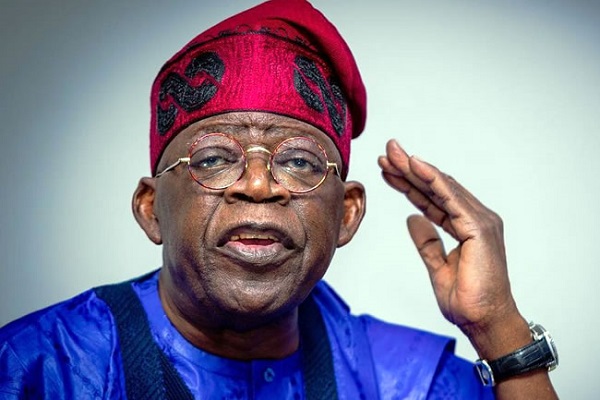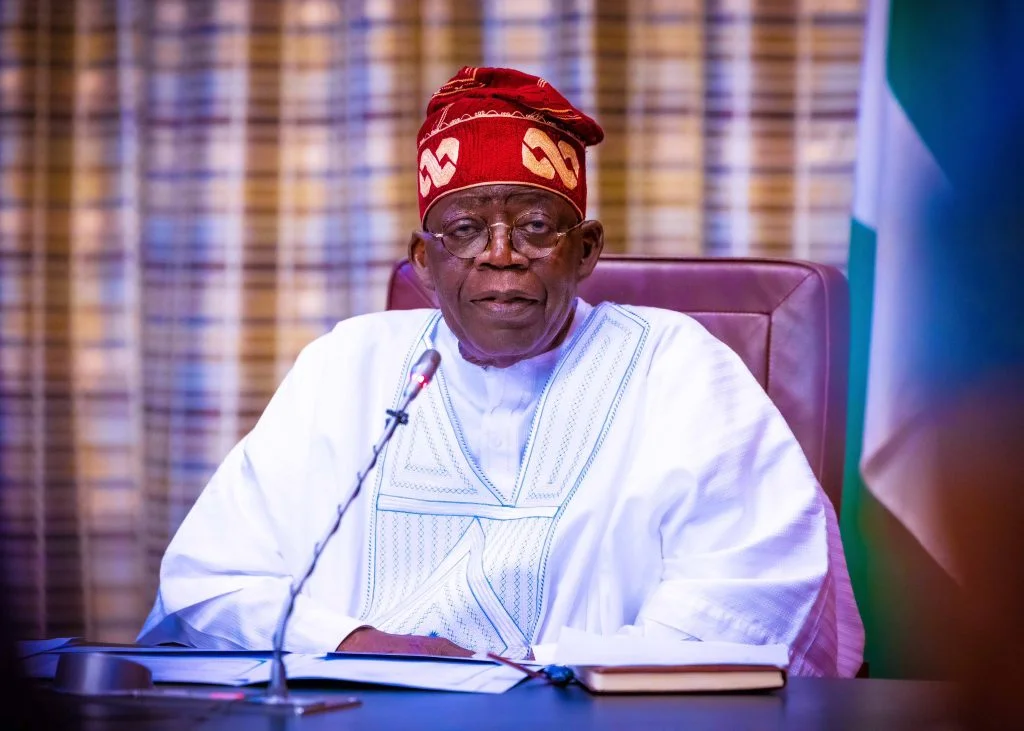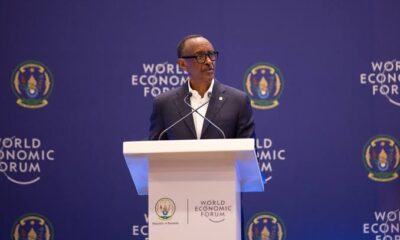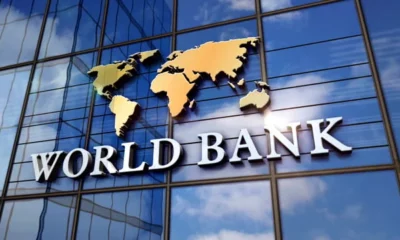Behind the News
Behind the News: All the backstories to our major news this week
Published
1 month agoon

Over the past week, there were lots of important stories from around the African continent, and we served you some of the most topical ones.
Here is a rundown of the backstories to some of the biggest news in Africa that we covered during the week:
1. Deadly terrorists’ demands cause outrage
Terrorists who abducted about 287 students and their teachers from schools in Kaduna State in North-West Nigeria, on March 7, caused a sensational outrage when they made an unprecedented ransom demand of N1bn for the release of the victims.
To add to the fear, the abductors gave the distraught parents and guardians of the captives a March 27 ultimatum to come up with the amount or they will kill all of them.
A leader in the community where the abduction of the school children and staff took place, Jubril Aminu, told journalists that he had received a call from the kidnappers who laid out their demands and threats.
“They made a total of N1bn ransom demand for all the pupils, students, and staff of the school,” Aminu said.
“They gave an ultimatum to pay the ransom within 20 days, effective from the date of the kidnap, March 7. They said they would kill all the students and the staff if the ransom demand is not met,” he added.
Aminu said the terrorists were emphatic about their demands and swore they would kill their victims if their demands are not met by the deadline.
Though this is not the first of such abductions of school children by bandits and terrorists, this is about the first time a ransom demand that huge will be made by their abductors.
The ransom demand and threats have also caused bad blood between the government and prominent Islamic cleric, Sheikh Ahmad Gumi following his call on the Federal Government to negotiate with the kidnappers for the hostages to be released.
The controversial cleric went as far as offering himself as a negotiator between the terrorists and the government but many Nigerians have been wondering what he stands to gain by often offering to help government negotiate with bandits and terrorists.
2. Tinubu bares fangs, insists govt will pay ‘no dime’ to bandits
In response to the N1 billion ransom demand by bandits who abducted 287 pupils and teachers from two schools in Kaduna State on March 7, President Bola Tinubu decided to play the tough guy by putting his foot down and declaring that his administration will not “pay a dime” to the kidnap gang.
The bandits had made a ransom demand along with a deadline to kill all the hostages if the families of the victims fail to pay the amount along with other demands including motorcycles and food items.
And while Nigerians waited with bated breath to see what the government will do, Tinubu surprised all by putting his foot down and insisting his administration would not pay any ransom for the release of the abducted victims.
“Mr President has reiterated his zero tolerance for the payment of ransom,” Minister of Information and National Orientation, Mohammed Idris, said after a Federal Executive Council meeting.
“Mr President has directed that no ransom will be paid by the government to any of these criminal elements,” the Minster added.
This will be the first time a Nigerian leader will stamp his feet and call the bluff of terrorists and bandits whenever they kidnap Nigerians and make outrageous ransom demands.
But it is left to be seen how the roulette game between the bandits and the government will end and who will blink first.
3. Nigerian communities on edge after murder of soldiers
In what is often referred to as “drawing of rain” in local parlance, two communities in Delta State, South-South Nigeria, may have drawn the ire of the Nigerian Army after 16 soldiers were ambushed, abducted and killed by youths in the communities.
The soldiers, including a Lieutenant Colonel, a Major, a Captain, and 12 other rank and file soldiers, were reportedly on a mission to restore peace between two warring villages – the Okuama and Okoloba communities of Ughelli South LGA of the state – when they met their deaths.
According to a statement by the Nigerian Army, the soldiers were on a rescue mission to Okuama community to free a hostage identified as Anthony Aboh, who was allegedly abducted over a lingering land dispute between the two communities when they were ambushed and killed.
“The troops of 181 Amphibious Batallion, Bomadi Local Government Area of Delta State, while on a peace mission to Okuoma community in Bomadi LGA of Delta State, were surrounded by some community youths and killed on Thursday, 14 March, 2024,” the statement said.
“The unfortunate incident occurred when the troops responded to a distress call after the communal crisis between the Okuama and Okoloba communities both in Delta State,” it added.
The horrific murder of the soldiers have thrown the residents of the communities into a frenzy of panic as many have fled for fear of a reprisal attack by military men who may want avenge the killings of their colleagues.
The scenario can easily be equated with what happened in 1999 when the Odi community in Bayelsa State was razed down by soldiers after 12 of their men were murdered by an armed militia gang.
Thousands of innocent civilians lost their lives in the invasion while the town is still to fully recover from the invasion.
4. For Hichilema, it never rains but pours
The troubles and opposition facing Zambian President Hakainde Hichilema, have continued to pile up with no end in sight following a petition by a group asking the US government to impose sanctions on him and some top officials in his administration.
In its petition, the group, Our Civic Duty Association (OCIDA), called on the US to place stiff sanctions including financial sanctions, visa restrictions and travel bans, against Hichilema and the seven top government officials for allegedly undermining democratic rights in the country.
The group led by Emeritus Archbishop Telesphore Mpundu, said it was “deeply worried by the continued abuse of institutions of governance and the erosion of democracy in Zambia.”
“Of particular concern are the violations of democratic rights such as the right to public assembly, free speech, freedom of association and the right to a speedy trial,” Mpundu said in the petition.
Though the civil society group is well within its rights to call for sanctions against the President and any government functionaries they deem wanting, the action is akin to still being tied to the apron strings of the western.
It is also a clear statement that many years after gaining independence from colonial masters, most African countries have found it difficult to conduct its affairs without involving the western world.
It also calls to question the penchant of African leaders to arrogate undue powers to themselves by truncating all tenets of democracy and ending up as dictators once they get into power.
5. When Diamond Platnumz caused his fiancee heartache
Tanzanian super star, Diamond Platinumz once caused serious heartbreak for his fiancee when he called off their wedding a few days to the great day because he was not ready for such long term commitment.
His sister, Esma Platnumz, who revealed this in an interview, said the two families were looking forward to the wedding and the Bongo Flava exponent had even ordered his suit Turkey before he chickened out.
Esma revealed that just when the wedding was about to be announced, her brother “abruptly changed his mind, citing concerns about rushing into marriage and wanting to make the decision with more certainty.”
“We can force him to get married but he’s not genuinely ready for it. He can get married to someone’s daughter and abandon her.
“We tried to persuade Diamond to get married to Sophia. Her family had already received a dowry and we were planning to visit her home and for formal arrangements.
“We’ve involved him several times, but I believe everything happens as God’s plan. God does his things whenever he wants,” she said.
As it stands, Diamond is fully enjoying his single status to the hilt and despite being a father of four.
And having had his fair share of some of the hottest women in Eastern Africa including Ugandan socialite, musician and actress, Zarinah Hassan, fashionista Hamisa Mobetto, as well as Kenyan model and singer, Tanasha Donna and currently seeing his protege Zuchu, it is left to be seen if the “Jeje” hitmaker has marriage in mind in the foreseeable future.
You may like
-


Behind the News: All the backstories to our major news this week
-


All my tough policy decisions are in Nigerians’ interest— Tinubu
-


Nigeria: President Tinubu identifies illegal mining as source of terrorism financing
-


Behind the News: All the backstories to our major news this week
-


Yoruba secessionist group seeks exit from Nigeria, writes open letter to Tinubu
-


‘Reconsider your anti-people policies, they are causing hardship, insecurity in Nigeria’— PDP tells Tinubu
Behind the News
Behind the News: All the backstories to our major news this week
Published
1 hour agoon
April 28, 2024
Over the past week, there were lots of important stories from around the African continent, and we served you some of the most topical ones.
Here is a rundown of the backstories to some of the biggest news in Africa that we covered during the week:
1. Renewed Hope: Tinubu’s regular sing-song and the sad reality of Nigeria
During the week in review, Nigeria’s President Bola Tinubu was once again at his rhetorical best when he pronounced the all the tough policy decisions and reforms he has undertaken since coming into office almost a year are have been in the best interest of Nigerians and the good of the country.
Tinubu who spoke during a bilateral business session with Dutch Prime Minister Mark Rutte at the Hague in the Netherlands, said every of his decisions were taken with the interest of his fellow citizens at heart.
He reiterated that his policies which have caused pains and anguish for Nigerians were in their best interest.
“I am a determined leader of my people. I am ever ready to take tough decisions in the best interest of the people, even if with initial pains,” Tinubu said.
“I have and will continue to take the difficult decisions that will benefit our people, even if there is short-term pain,” he added.
But beyond the regular promises of better days ahead by Tinubu and his team, the reality on ground in the country does not seem to align with so much optimism.
The first sign that things were going to be tough was when Tinubu pronounced the end of fuel subsidy in his inaugural address to the nation on May 29, 2023, without as much of a plan to ameliorate the anticipated economic crisis that was to follow.
Despite later attempts to provide some succour and buffers to cushion the effects of the subsidy removal, things have gone from bad to worse with the cost of living rising through the roof.
Inflation has gone up to an all time high of 30.20% according to the Nigeria Bureau of Statistics while prices of basic goods have gone beyond the reach of the average Nigerians, many who find it difficult to provide for their families.
But to President Tinubu, the pains and hardship Nigerians are currently going through will soon be a thing of the past because, according to him, his “tough policies” would yield positive results in the end.
“We have gone through the worst of the storms. I am unafraid of the consequences once I know that my actions are in the best long-term interests of all Nigerians,” he posited.
Nigerians are indeed waiting patiently for the fulfilment of these promises and are looking forward to a time they will go back to living a normal life again!
2. Discriminatory Chinese supermarket meets its match as Nigerian govt shuts mall
A Chinese supermarket located in the heart of Abuja, Nigeria’s capital, ran into hot water when the Federal Competition and Consumer Protection Commission (FCCPC), shut it down following allegations of discrimination against Nigerian shoppers.
Before the action of the government agency, a report had indicted that the supermarket located within the premises of the China General Chamber of Commerce in Abuja, was in the habit of barring Nigerian citizens from shopping in the mall.
Following the exposè which came with video evidence and investigations carried out by the FCCPC turned out to be true, officials of the agency promptly moved in and shut down the mall.
Director for Surveillance and Investigation of FCCPC, Boladale Adeyinka, who led the team, said they took the action was in response to a viral video showing Nigerians being discriminated against and not being able to get into an Abuja supermarket.
“The essence of the surveillance and investigation that we conducted today is to verify the allegations and the content of that viral video,” she told journalists during the exercise.
That was not the first time foreign business ventures have discriminated against Africans in their own country by refusing them their services.
A few years ago, a Chinese restaurant in Lagos was in the news for refusing to serve a Nigerian couple and it took the intervention of the state government for normalcy to return to the outfit after some Nigerian youth decided to vent their anger on the eatery.
Many Chinese, Lebanese and other companies run by foreigners in Nigeria have been found to discriminate against their Nigerian staff and customers but as usual, the powers that be have always turned a blind eye to such allegations, largely because the business owners have their plugs in the right places while the victims are always at the lower rung of the society.
3. Runaway Binance executive reportedly nabbed in Kenya
It was reportedly a bad day in the office for an executive director of global cryptocurrency firm, Binance Holdings Limited, Nadeem Anjarwalla, who had escaped from lawful detention in Nigeria, as he was arrested in Kenya.
Anjarwalla, a British-Kenyan citizen was arrested on arrival in Nigeria on February 26, along with another Binance official, Tigran Gambaryan, on allegations of tax evasion, money laundering and other charges.
But on March 22, Anjarwalla made an audacious escape from a guest house where he and Gambaryan were being held and was promptly declared wanted with the Nigerian authorities engaging the services of Interpol to help track him down.
The manhunt for Anjarwalla was ended when he was arrested in his hideout by a combination of Kenyan police and operatives of the Interpol.
The Kenya Police Service, in a statement confirming the arrest of the fugitive, said the fleeing Binance executive was arrested in “conjunction with the International Criminal Police Organisation (Interpol) and moves were being perfected for his extradition to Nigeria.
But beyond the arrest of Anjarwalla and the embarrassment it caused the country’s security agencies, a lot of questions have arisen from the episode.
Many Nigerians have continued to wonder how he managed to escape from the so-called safe house he and his colleague were being held.
How could Anjarwalla stage such an escape without the active connivance of some security officials who must have had their palms greased?
How did he manage to get a replacement passport to leave the country since his original passport had been seized by the Economic and Financial Crimes Commission upon his arrest?
Questions, and more questions have continued to rise and Nigerians are waiting for answers, if they will come at all.
4. Zambian CSO blames media polarisation for biased reportage
The Executive Director of a Zambian civil society organisation, Chama Mwansa, has blamed the polarisation of the media for biased coverage and reportage in the country.
Mwansa who is the ED of the Chandarika Women and Youths Foundation, in an interview with Zambia Monitor, said the media was balkanized between private and state-owned media outlets which has led to a bias in news coverage.
“The media plays a crucial role in society. Media freedom allows for comprehensive coverage of various perspectives, whether from the opposition or the ruling party,” she said in the interview.
She also harped on the importance of media freedom, freedom of speech, and digital rights in promoting social and economic development, and emphasized on the importance of media partnerships in facilitating coverage of events.
Mwansa’s observations on the polarisation of the media industry in her country can also be replicated in many African countries where the media is gagged and practitioners are made to look like the dregs of the society.
In many African countries, journalists are seen as dangerous species with many of them treated with disdain. Many journalists in different parts of the continent have been abducted, brutalized and killed for just doing their jobs which have constantly raised the question on the safety and freedom of journalists.
5. Al Ahly, Esperance in clash of titans for CAF Champions League trophy
For the fourth straight seasons, two of Africa’s most successful clubsides, Al Ahly of Egypt and Esperance of Tunisia, will clash in the final of the TotalEnergies CAF Champions League scheduled for next month.
Al Ahly which is the current holders of the title and their long-standing rivals Esperance, booked their places in the final in dramatic fashions to earn their places in the final of Africa’s epic football tournament.
Al Ahly cruised past former champions TP Mazembe of the DRC 3-0 in their two-legged semi final tie, while Esperance defeated another former winner, Mamelodi Sundowns of South Africa, running out with a 2-0 aggregate victory.
Al Ahly, winners of the five of the last seven editions of the CAF Champions League, will be aiming for her 12 trophy when they visit Esperance for the first leg in Rades on May 18, while the Tunisian giants will be gunning for a fifth Champions League title, which clearly puts the two teams as the best in the continent.
The second leg will hold in Cairo a week later, which, on paper, gives Ahly a sense of home advantage.
- But however it turns out, there will surely be fireworks as the two teams battle for the glory in the two-legged final and surely, whichever team comes out tops will be the best for the African continent.
Behind the News
Behind the News: All the backstories to our major news this week
Published
6 days agoon
April 22, 2024
Over the past week, there were many important stories from around the African continent, and we served you some of the most topical ones. Here is a rundown of the backstories to some of the biggest news stories in Africa that we covered during the week:
Nigeria’s big feat against meningitis
Nigeria made a significant step in its fight against the World Health Organization (WHO) announced on Monday that Nigeria is the first country in the world to give out Men5CV, a “revolutionary” new vaccine. People are getting sick more in Nigeria than anywhere else in Africa. They say that the number of cases each year went up by 50% in 26 African countries that are known to have a high risk of meningitis.
Nigeria is the first country in the world to have given this vaccine which protects against five strains of the meningococcus bacteria. The Vaccine Alliance (Gavi) pays for the vaccine and emergency vaccination operations.
In Nigeria, between October 1, 2023, and March 11, 2024, there was an outbreak of Neisseria meningitidis (meningococcus) serogroup C that caused 1742 suspected cases of meningitis, 101 confirmed cases, and 153 deaths in seven of the country’s 36 states. These states were Adamawa, Bauchi, Gombe, Jigawa, Katsina, Yobe, and Zamfara.
Gavi also pays for the global meningitis vaccine stockpile and helps low-income countries get regular meningitis shots. Nigeria is one of 26 countries in Africa where meningitis is very common. It is in an area called the African Meningitis Belt. The number of meningitis cases reported each year in Africa rose by 50% last year.
Being a serious infection, meningitis makes the membranes (meninges) that cover the neurons in the brain and spinal cord swell up. Viral, bacterial, fungal, and parasite pathogens are some of the things that can cause meningitis. Headaches, fevers, and stiff neck are common signs. Bacterial meningitis is the worst kind. It can also lead to septicemia, which is blood poisoning, and people who get it can become severely disabled or die within 24 hours.
Besides Nigeria’s meningitis vaccine campaign, the international summit on meningitis in Paris will be a big step toward ending the disease as leaders will meet to celebrate progress, discuss problems, and decide what to do next.
Britain /Rwanda migration deal remains stuck
Rishi Sunak’s plans to send asylum seekers to Rwanda took another defeat this week when they were turned down again by the upper house of parliament in Britain. The parliament came up with changes that would slow down the policy but not stop it. The leader of the country thinks this will help his party win the next election.
Last year, the British government said it was going to send thousands of refugees back to the East African country. This was done to stop people from trying to get protection by crossing the English Channel in small boats from France. Part of an agreement worth £148 million is the idea.
Despite a Supreme Court’s ruling against the controversial move, Sunak has pushed to enact the law through parliament, praying that British courts should consider Rwanda a safe place to visit and that people should only be able to appeal in very rare situations. Europeans have become worried about people coming in illegally from the Middle East and Africa these days. As of June 2023, a record 45,000 people had flown in small boats across the English Channel.
Since Monday, when the House of Commons turned down the House of Lords’ second set of plans to change the new laws, they tried again. The House of Lords is Britain’s appointed upper house. But it’s not likely that the move will stop the bill from being passed this week. If it does, it will become law.
Ahead of the elections later this year, Sunak has put a lot of political capital into the Rwanda plan. He says it will help him keep his word to stop small boats carrying thousands of people who are trying to get into Britain illegally.
About 14.4% of the UK’s population, or 9.5 million people, were born outside of the UK in 2021. A record 45,000 people, mostly from France, crossed the English Channel in small boats last year. More than 11,000 people have been here so far this year. Getting rid of illegal immigration is one of Prime Minister Rishi Sunak’s top objectives.
Burkina Faso takes further steps from France
West African country, Burkina Faso has continued its diplomatic stance against former colonialist, France as it expelled three French diplomats allegedly being involved in actions against the government. The West African country, under military rule like five others in the subregion in a letter sent April 16 to the French embassy said that the three diplomats, two of whom were named as political advisers, were told they were not welcome in the country and had 48 hours to leave.
Sources quoted by Reuters said the officials were kicked out because they met with people from the public. There have been five coups in the area in the last three years. Most of them were linked to ties with France. The latest coup in Niger could make things harder for food markets in Nigeria and other West African countries, the World Bank said not long ago.
Around the world, rights groups, and other interest bodies claim that the junta restricts the freedom of speech and is scaring off critics while it tries to deal with a security crisis caused by rebels with ties to Iran and Al-Qaeda.
Last year, the government announced that it had suspended the 2018 military accord with France, though it still wanted support in the form of equipment. France deploys about 400 special forces soldiers in Burkina Faso, which the military government rules, but relations have deteriorated and tensions have soared in recent months.
Burkina Faso is one of the poorest in the world, and over the past ten years, a war that started in Mali and spread across the Sahel has killed thousands of people. People in the country are more against France now than they were a few months ago because they think that France’s armed presence has not made things safer, expelling its diplomatic might just be another low in their relations as the wave against the former European colonialists continues across the subregion.
Nigeria: ‘World beater’ Onakoya sets new chess record
Nigerian chess prodigy, Tunda Onakoya began an attempt at a 58 hours play of the game to surpass the world record of 56 hours, nine minutes, and 37 seconds, which was set by the Norwegian duo of Hallvard Haug Flatebø and Sjur Ferkingstad in 2018. Onakoya has broken the record set in 2018 by 56 hours. He also wants to raise $1 million for his charity, “Gift of Chess and Chess in Slums Africa,” which he has used to help vulnerable children in Africa.
For 60 hours straight, Onakoya played in Times Square in New York City to raise money for the schooling of poor children in Africa as he played from Wednesday morning until early Saturday morning, having been inspired by the huge number of people who wanted to see him succeed.
Within Nigeria, Onakoya is well known for starting the Chess in Slums project in 2018 in Ikorodu, which is on the outskirts of Lagos. Often outcast young people, many of whom don’t go to school and work to support their families, can learn to play chess at the organization with the country having one of the highest rates of child absence from school in the world, with more than 10 million kids of school age not going to school.
The Guinness Book of World Records has not yet confirmed the new record. This process can take up to two weeks. Whatever the case, Onakoya’s accomplishment has already had a big effect, showing that even from “corners of disadvantage,” big changes are possible.
EDITOR’S PICK


Behind the News: All the backstories to our major news this week
Over the past week, there were lots of important stories from around the African continent, and we served you some...


Video: How Rwanda is driving Ai revolution in Africa
In this video, the Managing Director of Rwanda’s Centre for the Fourth Industrial Revolution, Crystal Rugege, speaks on the country’s...


This Sudan war is too senseless; time we ended it, By Tee Ngugi
Why are the Sudanese Armed Forces (SAF) and the paramilitary Rapid Support Forces (RPF) engaged in a vicious struggle? It...


Burkina Faso investigating reports of northern killings
A government spokesman has revealed that Burkina Faso is looking into reports that 223 people were killed by the Burkinabe...


Nigeria: Bureaux De Change operators to harmonise retail FX market
Amidst the volatility around the Nigerian currency and its foreign exchange market, the Association of Bureaux De Change Operators in...


France willing to pay for Morocco’s 3GW power line to Western Sahara
Bruno Le Maire, the French finance minister, said on Friday that France was ready to help pay for a 3...


Nigerian troops neutralise 216 terrorists, arrest 332 in one week— Official
The Nigerian Army Defence Headquarters (DHQ) says troops from different operation theaters across the country neutralised 216 terrorists and arrested...


Nigeria loses $9.2 billion to foreign shipowners
A group of maritime experts has revealed that Nigeria loses $9.2bn a year to foreign shipping lines that carry goods...


Nigeria wants managers for proposed $10 billion diaspora fund
A tender paper shows that Nigeria is looking for fund managers for a $10 billion diaspora fund to bring in...


Al Ahly, Esperance to clash in CAF Champions League final
Two of Africa’s club giants, Egypt’s Al Ahly and Esperance of Tunisia, will do battle next month over two legs...
Trending
-

 Sports1 day ago
Sports1 day agoAl Ahly, Esperance to clash in CAF Champions League final
-

 Culture1 day ago
Culture1 day agoCollabo with Burna Boy enabled me buy house for my mum— Mozambican DJ Tarico
-

 Tech1 day ago
Tech1 day agoRepAir, Cella partner to launch carbon capture in Kenya
-

 VenturesNow1 day ago
VenturesNow1 day agoWorld Bank grants Malawi $57.6 million for food crisis


